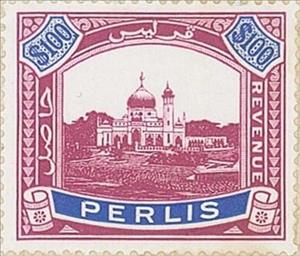Stamp: Alwi Mosque, Kangar (Perlis 1949)
Alwi Mosque, Kangar (Perlis 1949)
01 January (Perlis ) within release Revenue goes into circulation Stamp Alwi Mosque, Kangar face value 100 Malayan dollar
Stamp is square format.
Revenue Reverend cat. no: R2Also in the issue Revenue:
- Stamp - Alwi Mosque, Kangar face value 25;
- Stamp - Alwi Mosque, Kangar face value 100;
- Stamp - Alwi Mosque, Kangar face value 250;
|
Data entry completed
56%
|
|
|---|---|
| Stamp Alwi Mosque, Kangar in digits | |
| Country: | Perlis |
| Date: | 1949-01-01 |
| Print: | Typography |
| Perforation: | 13 |
| Emission: | Revenue |
| Format: | Stamp |
| Face Value: | 100 Malayan dollar |
Stamp Alwi Mosque, Kangar it reflects the thematic directions:
Architecture (Latin architectura, from the Greek ἀρχιτέκτων arkhitekton "architect", from ἀρχι- "chief" and τέκτων "builder") is both the process and the product of planning, designing, and constructing buildings and other physical structures. Architectural works, in the material form of buildings, are often perceived as cultural symbols and as works of art. Historical civilizations are often identified with their surviving architectural achievements.
A building or edifice is a structure with a roof and walls standing more or less permanently in one place, such as a house or factory. Buildings come in a variety of sizes, shapes and functions, and have been adapted throughout history for a wide number of factors, from building materials available, to weather conditions, to land prices, ground conditions, specific uses and aesthetic reasons. Buildings serve several needs of society – primarily as shelter from weather, security, living space, privacy, to store belongings, and to comfortably live and work. A building as a shelter represents a physical division of the human habitat (a place of comfort and safety) and the outside (a place that at times may be harsh and harmful).
Mosquitoes, the Culicidae, are a family of small flies consisting of 3,600 species. The word mosquito (formed by mosca and diminutive -ito) is Spanish and Portuguese for little fly. Mosquitoes have a slender segmented body, one pair of wings, three pairs of long hair-like legs, and specialized, highly elongated, piercing-sucking mouthparts. All mosquitoes drink nectar from flowers; females of some species have in addition adapted to drink blood. The group diversified during the Cretaceous period. Evolutionary biologists view mosquitoes as micropredators, small animals that parasitise larger ones by drinking their blood without immediately killing them. Medical parasitologists view mosquitoes instead as vectors of disease, carrying protozoan parasites or bacterial or viral pathogens from one host to another.
Muslims (Arabic: المسلمون, romanized: al-Muslimūn, lit. 'submitters [to God]') are people who adhere to Islam, a monotheistic religion belonging to the Abrahamic tradition. They consider the Quran, the foundational religious text of Islam, to be the verbatim word of the God of Abraham (or Allah) as it was revealed to Muhammad, the main Islamic prophet. Alongside the Quran, Muslims also believe in previous revelations, such as the Tawrat (Torah), the Zabur (Psalms), and the Injeel (Gospel). These earlier revelations are associated with Judaism and Christianity, which are regarded by Muslims as earlier versions of Islam. The majority of Muslims also follow the teachings and practices attributed to Muhammad (sunnah) as recorded in traditional accounts (hadith).




